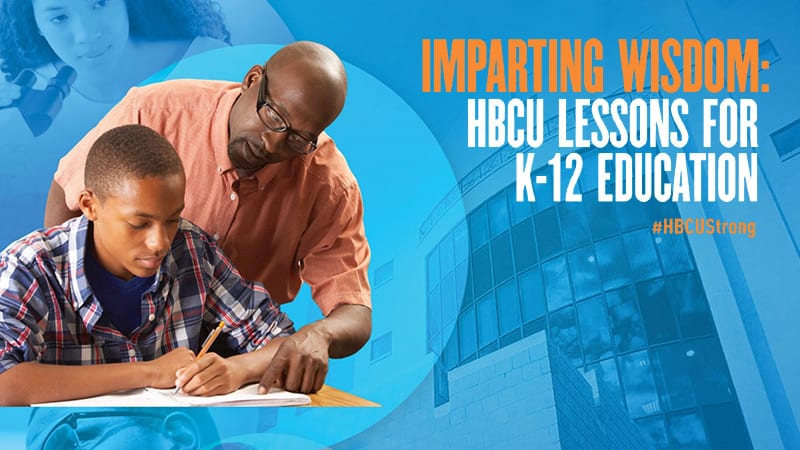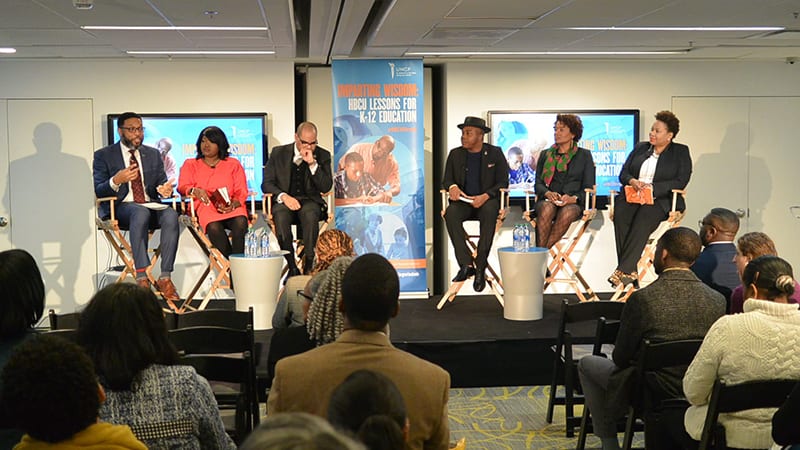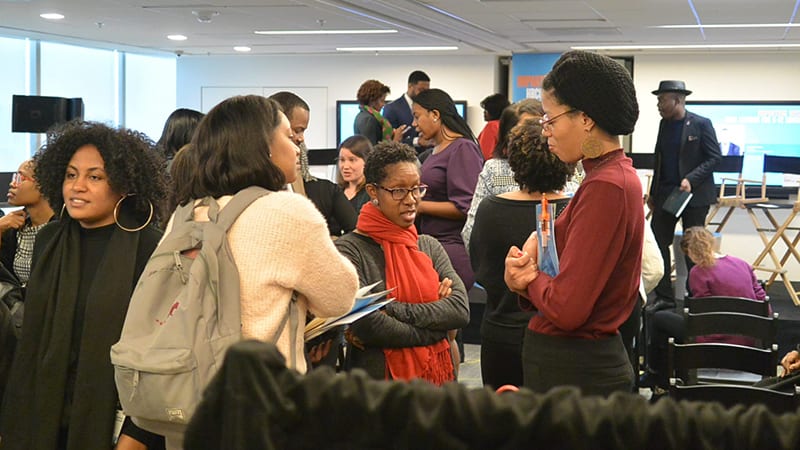INNOVATE
Imparting Wisdom to Educators: New Report Helps Pass on HBCU Wisdom to Empower Student Success across K-12 Grades
Not only have HBCUs forged paths for greater academic and social gains for African American students, they are also beloved by their beneficiaries and the larger Black community, as students report a heightened sense of racial consciousness. But what can other sectors within education learn from HBCU successes? In 2020, UNCF’s Frederick D. Patterson Research Institute (FDPRI) released a research report, Imparting Wisdom: HBCU Lessons for K-12 Education, which details HBCUs’ longstanding efforts to provide quality educational experiences for their students and how their success may be translated in K-12 schools—specifically schools with demographics similar to HBCU populations.
Despite the fact that HBCUs are top producers of African Americans who are medical doctors and those who earned STEM or doctoral degrees, they are oftentimes overlooked as potential resources for enabling high achieving Black students for K-12 educators. Imparting Wisdom highlights research-based HBCU best practices and recommendations and insights from HBCU leaders, with the goal of promoting mutually beneficial alliances between the K-12 and HBCU communities.
The HBCU best practices highlighted in the report can be implemented in both charter schools and K-12 school districts. The three best practices include:
- Cultivating Nurturing Support Systems: HBCUs promote a high level of student and faculty interactions, employ diverse faculty and implement strategies such as intrusive advising to build caring relationships among students.
- Leveraging African American Culture and Identity: HBCUs (1) make intentional efforts to promote student engagement based on culture by incorporating African American cultural elements into campus practices and within the curriculum; (2) help students develop a strong sense of identity; and (3) use African American culture to facilitate student success.
- Setting High Expectations: HBCUs offer meaningful mentorship to students and promote graduate school enrollment.
Imparting Wisdom also includes present-day examples of how programs and strategies executed at HBCUs have been implemented within local K-12 or charter school districts and how these strategies have succeeded for African American students. For example, in the report, Philander Smith University is highlighted for creating intentional partnerships with the local K-12 community and providing key scholarship opportunities for students who attend the college once they graduate from high school. Also, Xavier University of Louisiana is highlighted for establishing the Norman C. Francis Teacher Residency program which provides college students with master’s level coursework via an apprentice teaching opportunity and professional development. Students of this unique residency program go on to teach in local New Orleans schools, improving diversity within the local teacher workforce.
To discuss the strategies and spell out the recommendations outlined in the Imparting Wisdom report, UNCF hosted an HBCU and K-12 Education Summit as the report was unveiled in Washington, DC, in January 2020. The summit consisted of an overview of the report by co-author, Dr. Meredith Anderson, two separate panel discussions and a keynote address from Dr. Lewis Ferebee, chancellor, District of Columbia Public Schools.
The first panel discussed HBCU lessons that the K-12 sector can implement. Moderated by Dr. Brian Bridges, then-UNCF Vice President for Research and Member Engagement and co-author of the report, the panel was made up of UNCF-member presidents and executives, and HBCU alumni currently working within the K-12 education system:
- Dr. Nina Gilbert, director, Center for Excellence in Education, Morehouse College
- Dr. Hakim Lucas, president, Virginia Union University
- Marquise McGriff, founder and executive developer, Club 1964, and UNCF K-12 Walton Fellow alumnus
- Amanda Aiken, president, A. Leigh Solutions, Spelman College alumna
- Dr. Carmen Walters, president, Tougaloo College
Panelists stressed that HBCUs should be actively engaged with K-12 schools through collaborative programming.
As the keynote speaker, Dr. Lewis Ferebee spoke about how he earned his first-ever failing grade at his HBCU alma mater, North Carolina Central University, and how his English professor inspired him to work harder mentioning that the school’s combination of high standards and mentorship helped him to succeed. He challenged attendees to develop a continuous pipeline where we “blur the lines between K-12 and higher education in a way that there’s a high bar for all of our students, particularly students of color and infuse this bar into our historically Black high schools that are not [academically] where they should be.”
The second panel focused on specific HBCU and K-12 partnerships. Moderated by UNCF Vice President for Advocacy Sekou Biddle, the panelists included:
- Kenya Campbell, director, Norman C. Francis Teacher Residency Program, Xavier University of Louisiana
- Dr. Roderick Smothers, president, Philander Smith College
- Dr. Anthony Broughton, Call Me Mister director and assistant professor, Claflin University
- Thyais Maxwell, former principal, The Middle College at Bennett
- Kathryn Procope, principal, Howard University Middle School
Highlighted as well in Imparting Wisdom, both panels underscored how middle and high schools on college and university campuses can foster collaboration and greater exposure to college life for middle and high school students. The complete summit can be viewed here.
At UNCF, we know for the nation to close the achievement gap and improve academic outcomes, we must disrupt the current educational landscape and create an equity-focused, multi-faceted educational ecosystem built on intentional partnerships. HBCUs have proven to be pillars for academic success for African American students—and can impart these lessons to the K-12 education sector.
Imparting Wisdom provides a roadmap to those innovative outcomes, which means better futures for us all.



